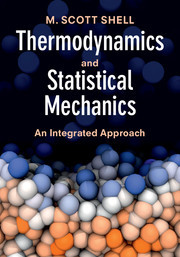Description
Thermodynamics and Statistical Mechanics
An Integrated Approach
Cambridge Series in Chemical Engineering Series
Author: Shell M. Scott
Learn classical thermodynamics alongside statistical mechanics and how macroscopic and microscopic ideas interweave with this fresh approach to the subjects.
Language: English
Subject for Thermodynamics and Statistical Mechanics:
Approximative price 126.22 €
In Print (Delivery period: 14 days).
Add to cart
Thermodynamics and Statistical Mechanics
Publication date: 04-2015
500 p. · 17x24.4 cm · Hardback
Publication date: 04-2015
500 p. · 17x24.4 cm · Hardback
Approximative price 61.25 €
In Print (Delivery period: 14 days).
Add to cart
Thermodynamics and Statistical Mechanics An Integrated Approach
Publication date: 04-2015
498 p. · 18.5x25.4 cm · Paperback
Publication date: 04-2015
498 p. · 18.5x25.4 cm · Paperback
Description
/li>Contents
/li>Biography
/li>
Learn classical thermodynamics alongside statistical mechanics with this fresh approach to the subjects. Molecular and macroscopic principles are explained in an integrated, side-by-side manner to give students a deep, intuitive understanding of thermodynamics and equip them to tackle future research topics that focus on the nanoscale. Entropy is introduced from the get-go, providing a clear explanation of how the classical laws connect to the molecular principles, and closing the gap between the atomic world and thermodynamics. Notation is streamlined throughout, with a focus on general concepts and simple models, for building basic physical intuition and gaining confidence in problem analysis and model development. Well over 400 guided end-of-chapter problems are included, addressing conceptual, fundamental, and applied skill sets. Numerous worked examples are also provided together with handy shaded boxes to emphasize key concepts, making this the complete teaching package for students in chemical engineering and the chemical sciences.
1. Introduction and guide to this text; 2. Equilibrium and entropy; 3. Energy and how the microscopic world works; 4. Entropy and how the macroscopic world works; 5. The fundamental equation; 6. The first law and reversibility; 7. Legendre transforms and other potentials; 8. Maxwell relations and measurable quantities; 9. Gases; 10. Phase equilibrium; 11. Stability; 12. Solutions - fundamentals; 13. Solutions - advanced and special cases; 14. Solids; 15. The third law; 16. The canonical partition function; 17. Fluctuations; 18. Statistical mechanics of classical systems; 19. Other ensembles; 20. Reaction equilibrium; 21. Reaction coordinates and rates; 22. Molecular simulation methods.
M. Scott Shell is an Associate Professor in the Chemical Engineering Department at the University of California, Santa Barbara. He earned his PhD in Chemical Engineering from Princeton in 2005 and is well known for his ability to communicate complex ideas and teach in an engaging manner. He is the recipient of a Dreyfus Foundation New Faculty Award, an NSF CAREER Award, a Hellman Family Faculty Fellowship, a Northrop Grumman Teaching Award, and a Sloan Research Fellowship.
© 2024 LAVOISIER S.A.S.

